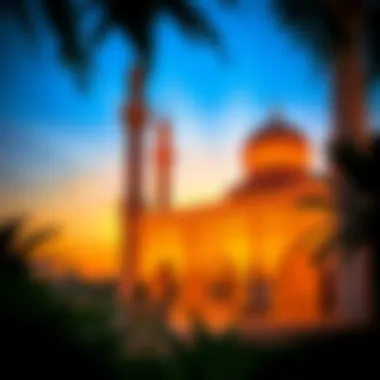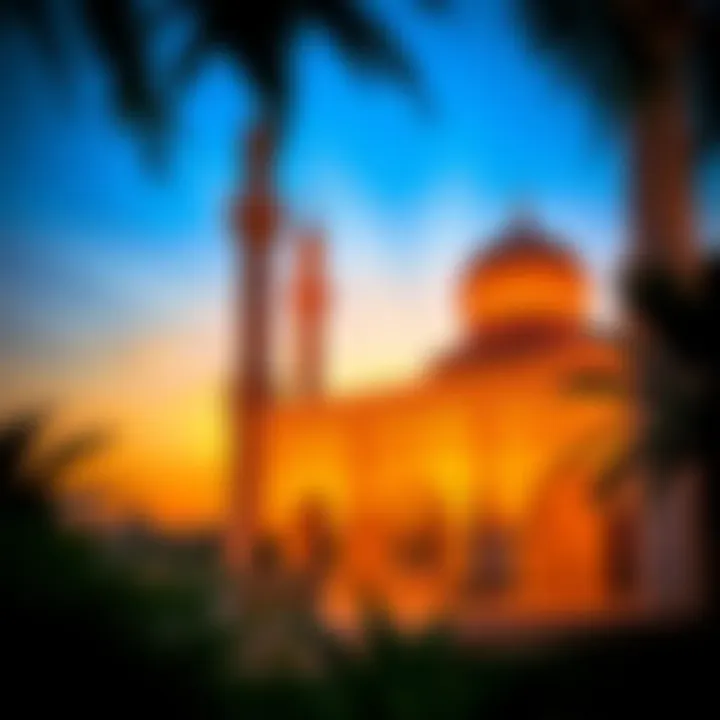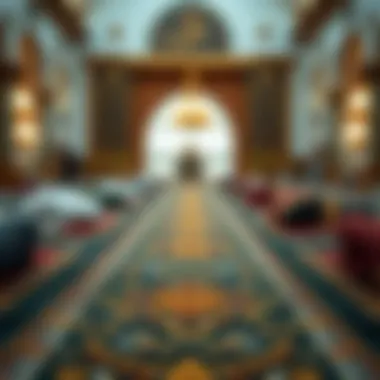Prayer Timings in Dubai: A Comprehensive Overview


Intro
Understanding the prayer timings in Dubai is not just about knowing when to pause for a moment of reflection; it’s about immersing oneself into the rich tapestry of life here. Dubai, where tradition and modernity weave together, offers a unique glimpse into how Islamic customs influence daily routines for both locals and tourists.
For residents, these prayer times, dictated by the position of the sun, serve as reminders to connect with their faith amidst the bustling pace of urban life. Tourists might find that adhering to these timings fosters deeper respect for the local culture, allowing for a more immersive experience as they traverse the city.
Traditionally, the city’s five daily prayers — Fajr, Dhuhr, Asr, Maghrib, and Isha — mark significant transitions in the day. Each prayer holds its own significance and timing, adjusted through seasonal changes influenced by sunrise and sunset.
Moreover, the system that determines these prayer times in Dubai does not just float in a vacuum. It interacts intricately with local traditions and practices that shape the community. In this overview, we shall delve into the fundamental aspects of prayer timings in Dubai, discussing their relevance, the seasonal variances that can influence them, and practical resources for accessing accurate timings.
This knowledge extends beyond mere observation; it's interwoven with respect and understanding among the diverse populace that makes up Dubai's vibrant community. Let’s now explore how prayer times are determined, and what they mean to the people who observe them.
The Importance of Prayer in Dubai
In Dubai, the significance of prayer transcends the mere act of recitation; it intertwines with the very fabric of life. Understanding the vital role that prayer plays in this bustling city is crucial, not only for those practicing Islam but also for residents and visitors from diverse backgrounds. It embodies a spiritual anchor for many, influencing personal routines, community interactions, and cultural traditions.
Understanding the Role of Prayer in Daily Life
For many individuals in Dubai, prayer is more than just an obligatory practice; it's a moment of connection. It allows for introspection and provides a space for reflection amidst the fast-paced lifestyle typical of a metropolitan area. The adoption of prayer times aligns daily activities with spiritual fulfillment. Many will plan their schedules around the five daily prayers, creating a rhythm that emphasizes discipline. This time to pause and connect with one's faith fosters a sense of balance.
In social and professional spheres, the timing of these prayers often respects communal obligations, facilitating coworking environments where colleagues understand and accommodate one another's needs. Friends often use prayer time as an opportunity to bond, making it a communal experience, which strengthens relationships.
Cultural Practices Surrounding Prayer
The cultural practices surrounding prayer in Dubai reflect a blend of traditional reverence and modern practicality. Mosques serve not only as places of worship but also as community hubs. Significant events, such as Eid celebrations, often draw large crowds, demonstrating the fervor with which prayer is integrated into community life.
Additionally, there are unique customs surrounding prayer that vary from region to region. For example, it is common to observe individuals performing ablution in public restrooms or designated areas prior to prayer. The community often engages in collective prayers at mosques, enhancing the importance of unity.
Furthermore, many shops and businesses pause for prayer breaks, illustrating how deeply ingrained these practices are within the daily business routine. This sets Dubai apart as a city that honors its traditions while navigating the demands of modernity.
"In Dubai, the sacred and the secular exist side by side, with prayer serving as a vital link between them."
Ultimately, recognizing the importance of prayer within Dubai provides insight into how Islamic traditions enrich the social landscape. It's more than a routine; it’s an essential aspect of daily existence that shapes not only individual lives but the city as a whole.
Overview of Prayer Times
Prayer times play a significant role in the everyday life of individuals in Dubai. Beyond mere scheduling, they reflect a cultural practice deeply interwoven with the local way of life. Understanding prayer timings in Dubai is not simply about knowing when to pray; it’s much more complex. It fosters coherence and respect among diverse communities in the emirate, where both locals and expatriates thrive together.
The calculation of prayer times is intrinsic to how the city's rhythm aligns with its religious practices and cultural nuances. For those living or visiting Dubai, it's crucial to acknowledge the significance of these prayer sessions, as they can impact various aspects of daily activities. For instance, businesses may adjust working hours, and social gatherings may be planned around prayer times. This necessitates an awareness of shifting schedules and the importance of these moments, which serve as not just reminders of faith but also as opportunities for interpersonal connection.
Definition and Significance of Prayer Times
Prayer times are fixed moments throughout the day when Muslims perform their obligatory prayers. These times are essential in Islam as they represent both a spiritual obligation and a connection with the divine. The five daily prayers—Fajr, Dhuhr, Asr, Maghrib, and Isha—provide rhythmic punctuations in daily life, dividing time into sacred intervals. For many, these moments offer tranquility in the bustling pace of contemporary life.
Five Daily Prayers Explained
Fajr: The Pre-Dawn Prayer
Fajr, the very first prayer of the day, occurs at the crack of dawn. This prayer encourages individuals to wake early, with the tranquility of pre-dawn moments leading to a sense of peace and reflection. The key feature of Fajr is its invitation for mindfulness right before the day unfolds.
Frankly, dedicating oneself to this early practice can help set a positive trajectory for the day. One notable advantage of Fajr in Dubai is that it allows individuals a moment of solitude. However, waking up before sunrise can be challenging for some, especially amidst the excitement of a vibrant city.
Dhuhr: The Midday Prayer


Dhuhr steps in once the sun has reached its zenith. This prayer is performed after the sun has passed its highest point, signaling a pause in the daytime hustle. It offers an opportunity to reconnect with spiritual contours during the workday.
The unique aspect of Dhuhr lies in its timing, which may shift depending on the season. Being in Dubai, where the sun can scorch, finding shade and contemplation during this midday break becomes a shared cultural practice. With the benefit of gathering with fellow worshippers at mosques, the sense of community strengthens during this mid-afternoon observance.
Asr: The Afternoon Prayer
Asr is highlighted as the afternoon prayer, steeped in tradition. This prayer occurs in the late afternoon, usually just before the day transitions into evening. The key characteristic of Asr is its reminder of the passing time; it symbolizes the balance of day and night.
Attending Asr can often serve as a refreshing pause for those who may feel the weight of the busy day. Yet, some may find themselves trapped in their professional obligations, creating a bit of a conundrum for maintaining both work and spirituality.
Maghrib: The Evening Prayer
Maghrib, observed just after sunset, carries a wonderful sense of closure to the day. As twilight unfolds, this prayer offers a brief reflection on the day's activities before darkness overtakes the sky. The benefit of Maghrib is in its timing, allowing for both individual contemplation and community gathering moments right after a long day.
The social aspect of Maghrib is particularly attractive in Dubai, where families and friends often come together to break their fast during the holy month of Ramadan, elevating its significance.
Isha: The Night Prayer
Isha, the final prayer of the day, wraps up the day's religious obligations. Performed when night fully envelops the city, it serves as a marker of closure and a time for greater introspection. The unique feature of Isha is that it allows individuals the space to reflect before sleep, paving way for spiritual connection after the daily hustle.
However, given that Isha is often performed later in the evening, it can sometimes clash with social activities in a vibrant city like Dubai. This tension can challenge some practices but also encourages individual discipline in maintaining spiritual commitments.
Calculation of Prayer Times in Dubai
Understanding how prayer times are calculated is essential for residents and visitors alike in Dubai. The times for daily prayers are not arbitrary; they are calculated based on specific astronomical and geographical data. This section will break down the key components involved in determining prayer times and why they matter.
Astronomical Considerations
At the heart of calculating prayer times is a set of astronomical phenomena. The primary factors include the position of the sun relative to the horizon. For instance, Fajr begins just before dawn when the sun is a certain amount of degrees below the horizon, typically around 18 degrees. Similarly, Dhuhr occurs when the sun reaches its zenith, while Asr is calculated based on the shadow length relative to an object. The calculations are precise, as even a minute can make a significant difference in the timing of the prayer.
The importance of these astronomical factors cannot be overstated, as they ensure that worshippers perform their prayers at the correct times, aligning their piety with natural celestial patterns.
Local Geographical Influences
Dubai's location also plays a crucial role in how prayer times are determined. Situated close to the Tropic of Cancer, the city experiences notable variations in day length throughout the seasons. This geographical peculiarity means that the timing for prayers can shift considerably from winter to summer. For example, sunset may occur much later in summer, affecting the Maghrib prayer timing.
Local terrain and urban factors, such as tall buildings and structures, can further influence when a worshipper may notice the sun's movement. Thus, the city's specific geographical considerations ensure that the prayer calculations reflect the actual experience of those living and working in Dubai.
Variations Throughout the Year
Due to the changing nature of daylight and the sun’s position, the calculation of prayer times varies throughout the year.
Adjustments During Ramadan
Ramadan brings a unique set of adjustments to prayer times. During this holy month, the fasting period complements the timings for Fajr and Maghrib prayers, with Fajr being the time before dawn and Maghrib signaling the end of the fast at sunset. This alignment plays a significant role in the daily lives of Muslims in Dubai. It encourages community engagement as families gather to break their fast together at the Maghrib prayer time.
The specific adjustments mean that the prayer schedule can shift even more dramatically, making it crucial for individuals to be aware of the revised timing to observe their fast properly. This brings a heightened sense of spirituality and community bonding, reinforcing the religious observance.
Effects of Daylight Saving Time
Daylight Saving Time does not currently apply in the UAE, but understanding the concept helps clarify why prayer times do not fluctuate according to it in Dubai. When considering other regions that observe Daylight Saving Time, it is evident how these changes can affect prayer times. In places like Europe or North America, there’s often a change by an hour, which requires continuous adjustment and awareness among the Muslim population there. However, for Dubai, the stability in prayer times means more predictability.
This consistency is beneficial for both individual worship and community practices, allowing individuals to plan their day without concern for sudden shifts in timing.


"In Dubai, knowing the calculations for prayer is not just about timing; it's a way to connect with faith and community in the fast-paced life of the city."
Changing prayer timings can turn out to be a bit cumbersome in places where daylight savings are in effect, illustrating that the straightforward nature of prayer timing in Dubai adds a layer of simplicity and accessibility for its residents.
Resources for Obtaining Prayer Times
In a city as vibrant and culturally rich as Dubai, knowing the prayer timings is vital not only for Muslims but also for those who live and work in this diverse environment. With the fast-moving pace of city life, being in tune with prayer times can facilitate a deeper connection to the community and help foster respect among the myriad cultures present. Ultimately, understanding these resources can ease the way for newcomers and long-time residents alike, ensuring no one misses the moment to pause and reflect.
Mobile Applications and Websites
In the digital age, mobile applications and websites have emerged as indispensable tools for accessing prayer timings. With a few taps or clicks, users can retrieve accurate schedules tailored to their specific locations within Dubai. These applications often come with additional features such as:
- Notification Alerts: Users can set reminders before each prayer, helping integrate prayer into daily routines.
- Qibla Direction: Many apps include a compass to assist users in locating the Qibla, which is essential for performing prayers correctly.
- Customizable Settings: Users can personalize timings based on their local mosque’s calculations or their preferred method of time calculation.
Some popular applications that fulfill these needs include Muslim Pro, IslamicFinder, and Ummah. Websites like IslamicFinder.org and Makkah.com can also serve as user-friendly platforms to look up the prayer timings quickly.
In Dubai, data from these apps is generally updated regularly to ensure accuracy, providing a reliable resource for anyone dependent on precise information.
Community and Mosque Announcements
Local mosques and community centers in Dubai play a key role in disseminating prayer times among residents. Most mosques display prayer schedules prominently outside their buildings, allowing passersby to easily take note of the upcoming prayers. Additionally, many mosques broadcast prayer times over loudspeakers, serving as a community reminder that prayer time approaches.
Prayers are often announced five times daily, creating a rhythmic backdrop of spiritual adherence across neighborhoods. Community centers may also share prayer timings through their social media pages or community boards, ensuring those who are less plugged into technology still receive this vital information. Local gatherings, particularly during the month of Ramadan, foster personal interactions about prayer timings and relevant events. This dynamic contributes to an inclusive environment where residents can engage with one another, share experiences, and deepen their understanding of Islamic practices in Dubai.
Understanding the various resources for obtaining prayer times can enhance the spiritual experience and promote greater cohesion among diverse communities.
Prayer Facilities Across Dubai
The vibrant city of Dubai boasts a rich cultural tapestry where Islamic practices form an integral part of daily life. The availability of prayer facilities reflects the city’s commitment to cater to its diverse population, promoting a sense of community among residents and visitors alike. Understanding the various prayer facilities in Dubai is crucial, not only for adhering to religious obligations but also for fostering a respectful atmosphere where everyone can practice their beliefs freely.
Mosques: A Central Aspect of Islamic Life
Mosques in Dubai serve as much more than places for worship; they are social and cultural hubs where individuals gather to strengthen their connections. Each establishment, from the grand Jumeirah Mosque to smaller neighborhood mosques, is designed to accommodate prayer and communal activities while embodying traditional Islamic architecture and values. Here’s why mosques hold such significance:
- Architectural Grandeur: Many mosques feature stunning designs and intricate artwork, acting as landmarks that represent the city’s heritage.
- Community Engagement: Mosques host events and programs such as Islamic education classes, interfaith dialogues, and charity initiatives that bring people together.
- Accessibility: The strategic placement of mosques throughout Dubai ensures that residents are never far from a place to pray, underscoring the commitment to religious practice within the urban environment.
As the sun rises and sets, the call to prayer resonates from these mosques, acting as a reminder for the faithful to engage with their spirituality amidst the bustling city life.
Prayer Rooms in Public Spaces
In a city like Dubai, known for its fast-paced lifestyle, the establishment of prayer rooms in public spaces is a thoughtful addition that showcases inclusivity. These facilities can be found in various locations: airports, malls, office buildings, and even parks. Each room provides a private, clean environment where individuals can perform their prayers without distraction or discomfort. Here are some key considerations:
- Convenience: The availability of prayer rooms ensures that whether one is shopping at Dubai Mall or traveling through Dubai International Airport, the commitment to prayer can be met without hassle.
- Amenities: Many prayer rooms are equipped with necessary amenities such as ablution facilities, provides a suitable environment for worshipers to prepare for prayer.
- Cultural Awareness: By offering these spaces, Dubai signals its respect for the spiritual needs of its residents and international visitors, creating a more harmonious setting.
"Facilities that cater to diverse religious practices are not just amenities; they are symbols of coexistence and mutual respect in a multicultural city."
Overall, mosques and prayer rooms in Dubai reflect more than just places of worship; they are a testament to the city’s Islamic identity, promoting community and respect among its residents and guests. Establishing these prayer facilities represents a commitment to maintaining spiritual practices amid the urban hustle, ensuring that individuals can carry their faith with them into every aspect of their lives.
Challenges Faced by Expats in Observing Prayer
Adapting to a new country's culture and customs is no easy feat. For many expatriates living in Dubai, integrating their own spiritual practices with the local customs can present unique challenges. Prayer, which holds significant importance in Islamic tradition, becomes one of the main areas where expats may struggle. It's not just a matter of understanding the timings; it’s about navigating how to practice prayer within a diverse and dynamic metropolis. This section delves into some specific hurdles expats confront while trying to observe prayer regularly and meaningfully in their new environment.
Adapting to Locally Observed Times


One of the first hurdles is adjusting to the local prayer times, which can differ from the prayer schedules in their home countries. In Dubai, the five daily prayers are precisely timed, dictated by the sun's position. This means that expats must familiarize themselves with these timings, which can shift daily. It’s not uncommon for new residents to find themselves scrambling to find a quiet corner or a mosque when they realize that the time for Dhuhr has sneaked up on them.
For many, dealing with daylight saving time variations adds another layer of complexity. In their home countries, prayer times may remain relatively stable throughout the year. However, in Dubai, changes can affect when prayers are observed, requiring expats to continuously check updated schedules. Moreover, balancing work commitments with prayer times can be tricky, especially in a fast-paced business environment known for its demanding schedules. In such situations, utilizing a trusty mobile app or local mosque schedules becomes paramount for organized time management.
"Prayer is not just a ritual; it’s a moment of peace and reflection amidst the hustle of city life."
Integrating Personal Spirituality with Local Customs
While adapting to the local prayer times is essential, it is equally important for expats to find ways to nurture their personal spirituality within the context of Dubai's rich cultural landscape. For many, this means exploring how their established spiritual practices can coalesce with local customs. This process can involve learning about the intricate nuances of the Islamic faith, attending community events, or engaging with locals who can offer insights.
Creating a network of support can also play a big role in this integration. Expats often find themselves seeking like-minded individuals, forming small communities within the larger expat network. Through social media groups and local meet-ups, they can discuss and share experiences related to prayer and faith, allowing for a richer understanding of local customs while maintaining their spiritual essence.
Still, merging different belief systems requires sensitivity and respect. Expats may need to reflect on their own practices and consider how they align with or differ from local Islamic traditions. Engagement in interfaith dialogues, where individuals of varying beliefs come together to share experiences, can foster a sense of community and cultivate respect.
In essence, the journey of navigating prayer amidst diverse customs is complex but profoundly rewarding. Expats who successfully tailor their spiritual practices to harmonize with Dubai's traditions often find themselves enjoying a richer and more connected life experience.
Community Engagement Through Prayer
Prayer in Dubai is not merely an individual act of worship; it serves as a powerful catalyst for community connection. Among the diverse landscape of this bustling metropolis, where cultures and beliefs intermingle, prayer offers a avenue for individuals to gather, reflect, and support one another. The act of praying together can fortify social bonds, instilling a sense of belonging amongst those who might otherwise feel isolated in a vast urban environment.
When workers leave their offices to join the midday Dhuhr prayers, it's more than just a religious obligation; it’s a communal event where conversations are sparked, friendships are nurtured, and community spirit flourishes. This shared experience fosters camaraderie, as individuals from varied backgrounds come together with a common purpose.
Prayer as a Means of Building Relationships
As people from various walks of life are drawn into the fold of prayer, it's easy to see how this practice fosters relationships that go beyond mere acquaintance. For instance, local mosques often host social gatherings post-prayer, creating a laid-back atmosphere that encourages dialogue. Whether it’s sharing a meal during Ramadan, discussing community projects, or engaging in light banter, these occasions allow friendships to bloom.
- Strengthening Ties: This regular interaction helps individuals learn from each other's experiences, effectively bridging cultural gaps.
- Community Support: When individuals know each other through these communal grounds, they become more likely to offer assistance in times of need—be it emotional support or practical help, such as during life transitions.
Interfaith Dialogue Initiatives
Dubai’s rich cultural tapestry has paved the way for interfaith initiatives that encourage dialogue among diverse religious communities. Prayer serves as a common ground for these initiatives. Through shared acts of worship and conversing about faith practices, participants can develop mutual respect and understanding.
Events like the Annual Interfaith Harmony Week bring together various faith communities, where prayers are held in unison, underscoring a commitment to peace and coexistence. Here, representatives from different beliefs share insights into their traditions, fostering a genuine sense of unity despite distinctions.
“True interfaith dialogue stems not from a desire to convert or persuade, but from a willingness to understand one another.”
Moreover, collaborative projects, such as community service during Ramadan, showcase how prayer and charitable acts strengthen communal ties. Engaging in joint charitable ventures helps to erase misconceptions and build relationships based upon shared values.
In summary, the communal aspect of prayer in Dubai serves as a foundation for building relationships and facilitating dialogue amidst a diverse population. The focus on inclusivity and mutual respect can lead to a more harmonious society, where everyone feels valued and connected.
Finale: The Future of Prayer Practices in Dubai
As Dubai continues to grow and evolve into a global hub of commerce and culture, the future of prayer practices in the city presents various intriguing dynamics. Emphasizing the importance of prayer in daily life, it becomes increasingly essential to examine how these rituals can adapt to a rapidly changing urban environment. The conversation surrounding this topic touches on multiple layers, from community cohesion to architectural integration, impacting both residents and newcomers alike.
Potential Changes in Urban Development
The future urban landscape of Dubai is being shaped by ongoing developments and innovations. As new neighborhoods and commercial areas spring up, we can expect a reevaluation of how prayer facilities are integrated within these projects.
- Mosque Accessibility: Future urban planning may prioritize locating mosques close to residential and business districts. This change could enhance accessibility, making it easier for individuals to observe their daily prayers without disruptive long travels.
- Design Innovations: There could be a rise in innovative designs incorporating prayer spaces into public structures, such as shopping malls and office buildings. This could serve to normalize prayers as part of everyday life, which would resonate well with both locals and tourists.
- Sustainability Efforts: In line with global trends, sustainable architectural practices might be adopted for these facilities, ensuring they remain energy-efficient and environmentally friendly while fulfilling their spiritual roles.
Maintaining Tradition Amidst Modernization
While the face of Dubai is constantly changing, the essence of its cultural practices must not be overlooked. The ability to maintain tradition amid modernization is vital for sustaining a rich heritage long into the future.
- Cultural Education Programs: Initiatives aimed at educating both expatriates and visitors about Islamic practices, especially concerning prayer, can help situate these traditions within a contemporary context.
- Community Initiatives: Local mosques may bolster their roles by organizing community events around prayer times, thus encouraging interaction and fostering understanding among diverse communities. This communal approach acts as a bridge between tradition and modernity.
- Balancing Modern Needs and Spiritual Needs: Ultimately, it is essential to balance the modern demands of life with the spiritual needs of the community. This could very well mean rethinking certain practices to cater to the lifestyles of contemporary Dubai residents while still honoring the foundational principles of their faith.
As we move forward, the essence of prayer in Dubai needs to blend seamlessly with urban life, ensuring that spiritual practices not only coexist but thrive alongside the city's dynamic growth.
By understanding these intricate layers, stakeholders can be better prepared to navigate the future of prayer practices, ensuring these rituals remain vibrant and relevant in the heart of a rapidly modernizing landscape. Through thoughtful integration and persistent dialogue, Dubai’s prayer practices are set to adapt and flourish in ways that respect its heritage while embracing what lies ahead.















